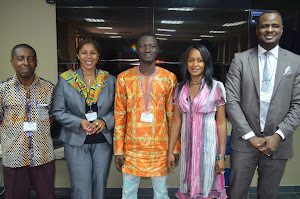FROM EDMUND SMITH-ASANTE, ABIDJAN, COTE D'IVOIRE
 |
| Participants in a group picture |
About 30 selected journalists from 11 countries of
the West Africa sub-region as well as Mauritania have gathered in the Ivorian
capital, Abidjan, to receive training on water financing and its protection in the
region.
Countries participating are Ghana, Togo, The Gambia,
Benin, Cote d’Ivoire, Guinea, Burkina Faso, Senegal, Mali, Niger, Nigeria and
Mauritania.
The 5-day capacity building, which commences today,
Monday, July 1, 2013, is being jointly organised by the Central and West Africa
programme of the International Union for Conservation of Nature (IUCN-PACO) and
the Global Water Partnership for West Africa (GWP-WA), under the theme: “Water
financing and protection of the resource in West Africa”.


















































